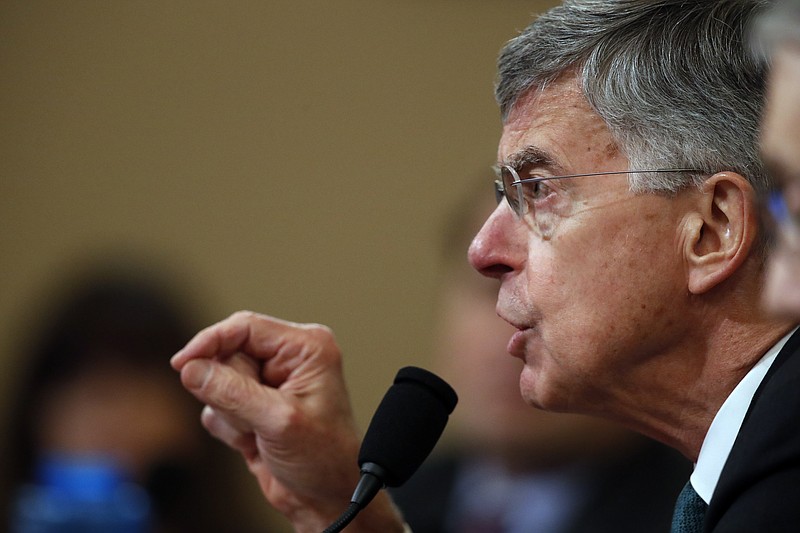WASHINGTON (AP) — For the first time, the Democrats’ case for President Donald Trump’s impeachment streamed Wednesday from Americans’ TVs, including a new contention that he was overheard asking about political “investigations” that he demanded from Ukraine in trade for military aid.
On day one of public U.S. House hearings — only the fourth formal impeachment effort in U.S. history — career diplomats testified in the open after weeks of closed-door interviews.
The account they delivered Democrats said reveals a president abusing his office, and the power of American foreign policy, for personal political gain.
“The matter is as simple and as terrible as that,” said Rep. Adam Schiff, the Democratic chairman of the Intelligence Committee, as he opened the daylong hearing. “Our answer to these questions will affect not only the future of this presidency but the future of the presidency itself.”
Career diplomat William Taylor, the charge d’affaires in Kyiv, offered new testimony that Trump was overheard asking on the phone about “the investigations” of Democrats he wanted Ukraine to pursue that are central to the impeachment inquiry.
Trump said he was too busy to watch Wednesday and denied having the phone call. “First I’ve heard of it,” he said when asked.
All day, the diplomats testified about how an ambassador was fired, the new Ukraine government was confused, and they discovered an “irregular channel” — a shadow U.S. foreign policy orchestrated by the president’s personal lawyer, Rudy Giuliani, that raised alarms in diplomatic and national security circles.
The hearing provided the nation and the world a close-up look at the investigation.
At its core, the inquiry stems from Trump’s July 25 phone call when he asked Ukraine’s newly elected president, Volodymyr Zelenskiy, for “a favor.”
Trump wanted the Ukraine government to investigate Democrats’ activities in the 2016 election and his potential 2020 rival, Joe Biden — all while the administration was withholding military aid for the Eastern European ally that is confronting Russia.
Both sides tried to distill it into soundbites.
Democrats said Trump was engaged in “bribery” and “extortion.” Republicans said nothing really happened — the military aid was ultimately released after Congress complained.
Trump restated his defense with tweets, a video from the Rose Garden and a dismissive retort from the Oval Office as he met with another foreign leader.
“It’s a witch hunt. It’s a hoax,” he said as he appeared with visiting Turkish President Recep Tayyip Erdogan by his side.
Viewers on the right and left thought the day underscored their feelings. Anthony Harris, cutting hair in Savannah, Georgia, had the hearing on in his shop, but he said, “It’s gotten to the point now where people are even tired of listening.”
The hours of partisan back-and-forth did not appear to leave a singular moment etched in the public consciousness the way the Watergate proceedings or Bill Clinton’s impeachment did generations ago.
“No real surprises, no bombshells,” committee member Rep. Chris Stewart, R-Utah, said.
Still, the session unspooled at least partly the way Democrats wanted with the somber tones of career foreign service officers telling what they knew.
The witnesses, Taylor and Deputy Assistant Secretary of State George Kent, defied White House instructions not to appear. Both received subpoenas.
They are among a dozen current and former officials who already testified behind closed doors. Wednesday was the start of days of public hearings that will stretch into next week.
Taylor, who was asked by Secretary of State Mike Pompeo to return to Ukraine as Trump was firing Ambassador Marie Yovanovitch, introduced new information Wednesday.
He testified a staff member recently told him of overhearing Trump when they were meeting with Ambassador Gordon Sondland at a restaurant the day after Trump’s July 25 phone call to the Ukraine president.
The staff member explained Sondland had called the president, and they could hear Trump on the phone asking about “the investigations.” The ambassador told the president the Ukrainians were ready to move forward, Taylor testified.
In the face of Trump’s denial, Schiff expected the person to appear before investigators for a closed-door deposition. He is David Holmes, the political counselor at the embassy in Kyiv, according to an official unauthorized to discuss the matter and granted anonymity.
Yovanovitch, a career officer who Kent has said was subject to Giuliani’s “campaign of lies,” is to testify publicly Friday.
Republicans sought to hear from the anonymous whistleblower by subpoenaing him for a closed-session. The panel voted down the request and Schiff and repeatedly denied the GOP claim that he knows the person.
“We will do everything necessary to protect the whistleblower’s identity,” Schiff declared.
The Constitution sets a vague bar for impeachment. There’s no consensus yet that Trump’s actions at the heart of the inquiry meet the threshold of “high crimes and misdemeanors.”

